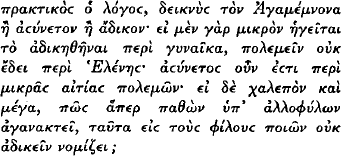Article contents
The Language of Achilles
Published online by Cambridge University Press: 11 February 2009
Extract
In a brief article under the present title, Adam Parry raised a simple but profound question: were there certain things that the inherited vocabulary of oral poets did not allow them to sayF; The mere raising of this question, whatever his answer, is enough to make the article one of the more important contributions to Homeric studies in the last fifty years. As it happens, his answer was affirmative, and it has not been contested. Contested it will now be.
- Type
- Research Article
- Information
- Copyright
- Copyright © The Classical Association 1973
References
page 193 note 1 T.A.P.A. lxxxvii (1956), 1–7,Google Scholar reprinted in The Language and Background of Homer, ed. Kirk, (Cambridge, 1964), 48–54.Google Scholar
page 193 note 2 P. 2 = 49.
page 193 note 3 One of the few is Fränkel, H. in Die homerischen Gleichnisse (Göttingen, 1921),Google Scholar a work vigorously and justly assailed by Jachmann, , Der homerische Schiffskatalog and die Iliac (Cologne, 1958), 221–3, 267–338. Incidentally, Fränkel's view of![]()
![]() , more plausible of its kind than Parry's, is that it reflects the mood of the Trojans (p. 34).CrossRefGoogle Scholar
, more plausible of its kind than Parry's, is that it reflects the mood of the Trojans (p. 34).CrossRefGoogle Scholar
page 193 note 4 P. 6 = 53.
page 193 note 5 Parry extends his argument to 16. 49–100 and 22. 378–94 (P. 7 = 54), but the contradictions he sees in both passages, so far as they are there at all, arise from the unusual sentiments expressed in 9. 308–429.
page 194 note 1 P. 6 = 53.
page 194 note 2 True as it is that neither![]() nor
nor![]() occurs elsewhere in Homer, Parry's argument would have been much too sweeping if he had maintained that every unparalleled phrase is a misuse of traditional language, for he would have found himself drawing wide conclusions from lines like
occurs elsewhere in Homer, Parry's argument would have been much too sweeping if he had maintained that every unparalleled phrase is a misuse of traditional language, for he would have found himself drawing wide conclusions from lines like![]()
![]() .
.
page 194 note 3 Parry himself admits that the question![]() in 337–8 is answered by Achilles in 339:
in 337–8 is answered by Achilles in 339:![]() ; (p. 6 = 53 n. 12). He regards it as unanswerable because ‘it seems, as we read the speech, of wider scope than the answer given. We feel that the justification of war itself is being called in question’. If that is our feeling, we have lost the thread of the argument. The scholia unravel it satisfactorily:
; (p. 6 = 53 n. 12). He regards it as unanswerable because ‘it seems, as we read the speech, of wider scope than the answer given. We feel that the justification of war itself is being called in question’. If that is our feeling, we have lost the thread of the argument. The scholia unravel it satisfactorily: ;
;
page 195 note 1 In structure it is quite the opposite: cf. 1. 98:![]()
![]() .
.
page 195 note 2 ‘I will not here discuss Achilles’ speech in any detail. But few readers of it, I believe, would disagree that it is about… a cleavage between seeming and being…. The disillusionment consequent on Achilles’ awareness of the cleavage, the questions his awareness of it gives rise to, and the results of all this in the events of the war, are possibly the real plot of the second half of the Iliad' (p. 6 = 53).
page 195 note 3 In the whole of 308–97, two passages alone could be thought to reveal a general disillusionment: 337–8![]()
![]() , which needs to be read in context (cf. above, p. 194 n. 3), and 320
, which needs to be read in context (cf. above, p. 194 n. 3), and 320![]()
![]() , which is indeed out of place. In 321–36 Achilles is levelling a specific charge at Agamemnon, and it is unnecessary to put a general interpretation on 316–17:
, which is indeed out of place. In 321–36 Achilles is levelling a specific charge at Agamemnon, and it is unnecessary to put a general interpretation on 316–17:![]()
![]() (cf. 17. 147–8). Of the three epigrammatic lines that follow, 318 and 319 are consistent with a specific charge, but 320 is not, and it is tempting to suppose either that the first two attracted the third or that the context attracted all three (certainly the sense runs on smoothly from 317 to 321). Be that as it may, 320 is no more responsible than 337–8 for the misuse of language in 387, which belongs to a different stage of the argument.
(cf. 17. 147–8). Of the three epigrammatic lines that follow, 318 and 319 are consistent with a specific charge, but 320 is not, and it is tempting to suppose either that the first two attracted the third or that the context attracted all three (certainly the sense runs on smoothly from 317 to 321). Be that as it may, 320 is no more responsible than 337–8 for the misuse of language in 387, which belongs to a different stage of the argument.
page 195 note 4 It would be another thing to say that 398–416 were not originally composed for the present context.
- 11
- Cited by


